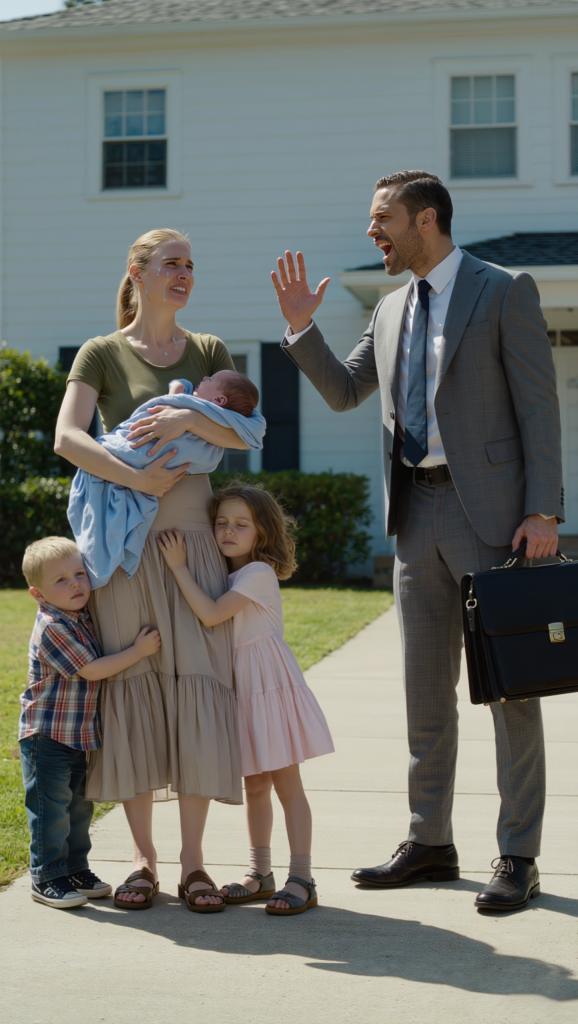He had it all: a loyal wife, five adoring children, and a palatial home shining like a dream. Yet one night, with a cruel word, he sent them away like they meant nothing. Years later, he would return broken — and even his children would barely recognize him.

In the grand marble room of their Guadalajara mansion, Ernesto Villarreal’s voice rang like steel.
“I don’t ever want to see you in this house again — you and those children.”
Magdalena stood frozen, heart thudding. Five pairs of frightened eyes watched silently. “Please,” she whispered, “they’re your children.” But Ernesto’s contempt had hardened. He raised his wine glass, gestured to the door.
“Go. Now. Before I regret not doing it sooner.”
Camila, twelve, trembled. Luisito hugged his brother Mateo. Lucía clung to her mother’s skirt. The youngest, Tomás, sobbed in innocent confusion. Magdalena steadied herself, gathering the children and walking out into the humid night.
The city hum of life went on as though nothing had changed. No one stopped, no one offered help. They walked through silent streets, loaded with a single worn backpack. No destination. No safety net. Magdalena’s old friends had drifted toward comfort and wealth; no one remained.
Camila’s voice broke the silence: “Mom, are we going to sleep outside?”
She swallowed sorrow. “No, cariño. We’ll find a place. I promise.” Desperate, she remembered a name: Damián López. An old friend, a man she once almost loved.
They arrived in Tlaquepaque, to a modest street with dim lights and simple homes. Magdalena knocked on a door she never expected she’d need to open.
The lock turned. Damián appeared, rugged and kind-eyed. He looked at her and then at her children.
“Magdalena?” he asked. She could only cry. He stepped aside. “Come in. My house is small, but it’s enough.”
That night she slept without fear — not because she found grandeur again, but because she found refuge.
Their new days were humble — wooden floors, peeling paint, the soft scratch of pencils, the creak of chairs. Yet for the first time in years, hope had room to breathe.
One morning, three hard knocks rattled the door. A thin woman in white handed Magdalena legal papers: a civil suit filed by Ernesto Villarreal. Fraud. With her signature woven into the documents. The peace they had carved was under siege again.
Damián stood firm: “We will fight this.” Magdalena nodded, raw but resolute.
That night, she discovered a hidden box under their mattress — old contracts, bank instructions, Ernesto’s handwriting. He had used her name to funnel money to shell accounts. The evidence stung. She hid the box; she would tell no one yet. She could not risk losing again.
At dawn, she washed her face, looked in the mirror. The woman in satin and diamonds was gone. A mother remained — tired, scarred, but unbroken.
She walked the streets of Tlaquepaque, knocking on doors, asking for work. Rejected often, until she found a woman who would let her wash dishes in a tiny kitchen. She accepted with gratitude.
Back home, Damián and the children waited. Camila asked, “Was it easy, Mom?” She shook her head. “No. But it’s worth it.”
They sat down to four pastries, each broken in half, swallowed with gratitude. The small home felt full of more than just walls — it held dignity, laughter, a fragile peace.
But danger loomed. Three dark knocks sounded late that night. A man in a suit delivered a court summons: appear in three days. The war had reached their door.
Across town, in polished bars and dim lights, Ernesto boasted of plans and control. But behind the glare, betrayal had already struck. He had handed over his assets, trusting someone else. That night, his bank accounts were closed. His world unraveled.
He awoke in a shabby hotel, alone. He shuffled clothes into a suitcase. He walked the streets, watched couples, vendors, laughing children — lives he once thought beneath him, now full. He went to pawn his gold watch. For food, he found street tacos. For rest, none.
Meanwhile, in their whitewashed house, Magdalena and her children sat around a simple meal. In Damián’s steady eyes, in the children’s laughter, she felt something richer than pride. She had been cleansed of illusions, left with what truly matters.
Ernesto’s return was met with locked doors and silent walls. He knocked. No one came. No one welcomed him. He had built a kingdom of emptiness — and now, with nothing but regret, he walked away.
Because sometimes, losing the grand house is the first step toward finding a home.